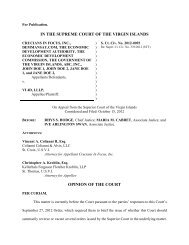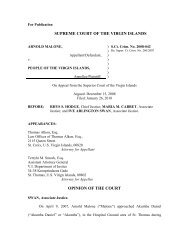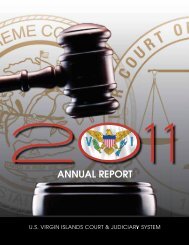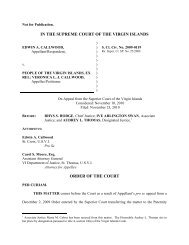Murrell v. PeopleS. Ct. Crim. No. 2009-0064Opinion of the CourtPage 2 of 13this Court denies the Public Defender’s motions to withdraw pursuant to Anders and furtherholds that this Court shall no longer entertain motions to withdraw pursuant to Anders, butinstead require every court-appointed attorney in a direct criminal appeal as of right to submit amerits brief pursuant to Supreme Court Rule 22(a).I. FACTUAL AND PROCEDURAL BACKGROUNDOn November 27, 2007, Appellee People of the Virgin Islands (hereafter “People”) fileda two-count criminal complaint charging Murrell with driving under the influence in violation oftitle 20, section 493(a)(1) of the Virgin Islands Code and negligent driving in violation of title20, section 503 of the Virgin Islands Code. On January 31, 2008, the Superior Court granted thePeople permission to amend the information to add a second count of negligent driving. Thematter was originally scheduled for a jury trial. However, Murrell’s court-appointed trialcounsel—also an attorney employed by the Public Defender—notified the Superior Court onApril 9, 2008 that he had discussed a waiver of jury with Murrell, but that Murrell objected, andon April 21, 2008—the day of jury selection—Murrell’s trial counsel requested that the SuperiorCourt invoke title 14, section 4 of the Virgin Islands Code, 1 which it did on the same day. Abench trial occurred on July 7, 2008, which concluded with the Superior Court finding Murrellguilty of all three counts. Murrell timely filed a notice of appeal on July 15, 2008, and theSuperior Court subsequently entered its written Judgment and Commitment on July 17, 2008. 21 This statute reads, in its entirety:14 V.I.C. § 4.In misdemeanor cases only, trial judges are authorized to limit the term of imprisonment to sixmonths in prison; in which event, the defendant may be tried by the court, except in cases where amandatory sentence is imposed.2 “A notice of appeal filed after the announcement of a decision, sentence, or order – but before entry of thejudgment or order – is treated as filed on the date of and after the entry of judgment.” V.I.S.CT.R. 5(b)(1).
Murrell v. PeopleS. Ct. Crim. No. 2009-0064Opinion of the CourtPage 3 of 13On January 22, 2010, after the Public Defender filed a completed criminal appealinformation sheet and the court reporter filed the pertinent transcripts with this Court, the Clerkof this Court issued a briefing schedule to the parties, which required that the Public Defenderfile Murrell’s appellate brief and the joint appendix on or before March 3, 2010. However, thePublic Defender did not file a brief or appendix on this date but, on March 5, 2010, filed amotion for leave to file an Anders brief out of time. This Court, in a March 11, 2010 Orderentered by a single justice pursuant to Supreme Court Rule 21(c), 3 denied the Public Defender’smotion for leave to file out of time and rejected its Anders brief due to several deficiencies withthe attempted filing:As a threshold matter, this Court notes that the certificate of serviceattached to [the Public Defender]’s motion for leave to file out of time states thata copy of the motion was served on the [People], but does not indicate that it wasserved on [Murrell]. This Court has consistently held that all documents a courtappointedattorney files with this Court pertaining to an attempt to withdrawpursuant to Anders must be served on the Appellant. See St. Louis v. People,S.Ct. Crim. No. 2007-0086, 2008 WL 5605712, at *1 (V.I. Oct. 10, 2008);Murrell v. People, S.Ct. Crim. No. 2009-0035, slip op. at 2 (V.I. Dec. 3, 2009);see also V.I.S.CT.R. 21(a) (“[A]n application for an order or other relief shall bemade by filing a motion for such relief with proof of service on all other parties.”(emphasis added)). Notably, although the certificate of service affixed to [thePublic Defender]’s Anders brief states that a copy of the Anders brief was handdeliveredto [Murrell], a certificate of service on an Anders brief itself isinsufficient proof that other documents filed with the Anders brief were served onthe Appellant. See Murrell, slip op. at 2. Consequently, [the Public Defender]’sfailure to indicate that the motion for leave to file out of time was served on[Murrell] provides grounds for this Court to deny [the Public Defender]’s motion.However, even if this Court were to overlook [the Public Defender]’sfailure to serve a copy of the motion for leave to file out of time on [Murrell], itdoes not appear that the documents [the Public Defender] seeks to file out of timecomply with this Court’s requirements governing requests to withdraw pursuantto Anders. Significantly, although the Anders brief filed with [the PublicDefender]’s motion for leave to file out of time requests that this Court permit3 “In addition to the authority expressly conferred by these Rules or by law, the Chief Justice, or any other justicedesignated by the Chief Justice, may entertain and may grant or deny any non-dispositive motion or other pretrialmatter including, but not limited to, briefing schedules, motions for extensions of time, and motions for substitutionof counsel. The action of a single justice may be reviewed by the Court or the appellate panel.” V.I.S.CT.R. 21(a).
















